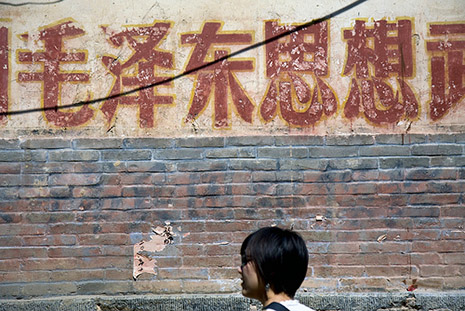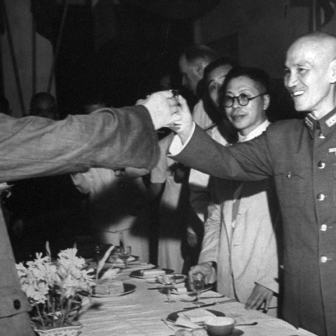THE suspension of Chinese Politburo member Bo Xilai on suspicion of abuse of power, along with the detention of his wife and a member of her staff for their suspected involvement in the death of British businessman Neil Heywood, has raised awkward questions for China’s leadership as it seeks to rally the nation around the new generation of leaders due to be unveiled later this year. The alleged crime aside, revelations about the family’s wealth and rumours of abuses of power have fuelled public debate – and plenty of speculation – about corruption and privilege at the highest levels.
But the case has also focused attention on China’s past. Even before his detention, Bo was seen by some as a potentially dangerous maverick, mainly as a result of his zealous efforts, in public at least, to revive traditional socialist values in Chongqing, the city he ran. Slogans from the Maoist era were dusted off, citizens were encouraged to sing old revolutionary songs, mass rallies were held in parks pledging loyalty to the Communist Party, and the city’s most widely viewed television station rejected advertising and focused on a diet of dramas highlighting the party’s heroic revolutionary past.
It’s not clear how seriously Bo Xilai believed in all this. Some have suggested the campaign was partly a genuine effort to improve crumbling social cohesion and partly political posturing aimed at boosting his chances of promotion this year. The aim, they argue, was to win support from conservative members of China’s establishment, who may have been suspicious of the English-speaking Bo’s image as a “moderniser” in his previous posts as mayor of the investment-friendly port city of Dalian and later as China’s commerce minister.
Nevertheless, many liberals in China were alarmed by these campaigns, with their overtones of demagoguery, and by Bo’s high-profile crackdown on crime and corruption in Chongqing, which many felt rode roughshod over the rule of law. Some feared that if he were promoted he might really try to take China back to the days of blind loyalty and leader-worship seen during the Cultural Revolution of the 1960s – a tragedy that left many hundreds of thousands dead and affected the lives of hundreds of millions more.
Many observers saw it as no coincidence that China’s prime minister Wen Jiabao made a rare public reference to the Cultural Revolution on the day before Bo was sacked as Chongqing party secretary, warning that those years had left a legacy which had not been completely erased and could yet return to haunt the nation. Wen is seen as having relatively liberal tendencies, which he seems keen to burnish as he approaches retirement: speaking at his last annual televised news conference, he spoke of an “urgent” need to press ahead with “political structural reform, in particular reform in the leadership system of our party and country.” Otherwise, he warned, economic reforms might be derailed and “such historical tragedies as the Cultural Revolution may happen again.”
He didn’t give details of the political reforms he sought, but in recent years he has called for greater transparency and accountability within the system, and has advocated increased public scrutiny of the party and government – in other words, some form of counterbalance to the power of officials. His emphasis on reforms at this stage may reflect worries that traditional leftists are seeking to rally support, spurred by public dissatisfaction at rising social inequality, and also concerns about the apparently increased influence of China’s hardline security establishment over the past few years.
Whatever the case, Wen could hardly have chosen a more dramatic way to make his point. References to the Cultural Revolution by Chinese leaders are few and far between these days; this was a rare case of the phrase appearing on the front pages of Chinese newspapers (though some obviously still found the remarks too sensitive, and buried them on inside pages). And Wen’s comments clearly chimed with many: “This worry has circulated among the public, but this time it came from the mouth of a premier,” noted the official Global Times approvingly. Hu Shuli, a well-known liberal magazine editor, wrote of “the critical importance of such a senior-level rejection of the Cultural Revolution.” Wen’s remarks, she said, were a vital step to combat what she called China’s “collective amnesia,” adding, “our younger generations don’t have the remotest inkling of the Cultural Revolution” and “older generations do not dare look back.”
It’s a worry that seems to have become increasingly widespread among Chinese intellectuals. The Cultural Revolution was one of the darkest periods of the twentieth century: launched by party chairman Mao Zedong in the second half of the 1960s in response to what he saw as attempts by other leaders to dilute socialist policies with economic reforms, it turned into a personality cult that brought with it mass anarchy and, at times, something like collective madness. In 1967–68, teenaged Red Guards, inspired by Mao’s call to root out all vestiges of China’s “old society,” which he said were undermining the revolution, went on the rampage. They denounced their teachers, their friends, even their families. Homes were ransacked and millions of people labelled counter-revolutionaries; they were paraded and beaten in public and forced to write self-criticisms and confess to “crimes” they often didn’t even understand. Countless numbers were jailed, executed or simply beaten to death – including some of China’s top political leaders, and many intellectuals. Others committed suicide. For several years, many schools and universities were closed, and tens of millions of urban young people sent to the countryside to work on the land and be “re-educated” by the peasants. Many did not return for five years or a decade, some for far longer. Few families were unaffected.
Yet it is striking to note the extent to which the Cultural Revolution is, if not exactly taboo, then often glossed over or skated around by officialdom in China today. The official line is that the reckoning is already complete: after Mao’s death in 1976, his wife Jiang Qing and the other radicals who made up the Gang of Four, which guided policy in Mao’s later, infirm years, were arrested and jailed for life. Over the following years, much was done to undo some of the injustices – millions returned from the countryside to their homes, the verdicts on many “counter-revolutionaries” were overturned (often posthumously) and, with the return to power of leaders like Deng Xiaoping who had suffered in the Cultural Revolution, the party began to reduce the influence of dogma on daily life.
Significantly, though, the leadership was not willing to undermine the entire legacy of the man who had led the revolution, and in whom everyone had, for years, been told to believe. Deng Xiaoping in particular is said to have felt that jettisoning Mao entirely would have been too traumatic. In 1981 the party passed a formal verdict ascribing “chief responsibility” for launching the Cultural Revolution to Mao, but stressed the Gang of Four’s role, emphasising that the movement had been “manipulated by counter-revolutionary cliques… bringing serious disaster and internal chaos.” An official appraisal pronounced the chairman to have been 70 per cent right and 30 per cent wrong. But in recent years even this has rarely been mentioned: with the party seeking to maintain its legitimacy in fast-changing times, Mao has become something of an untouchable icon of Chinese nationalism. His body remains in its mausoleum in Tiananmen Square and his image stares out from all China’s banknotes, emphasising his official status as the benevolent godfather of the nation’s liberation from foreign domination.
ALL this has made delving into the Cultural Revolution, whether into Mao’s role or into the brutal results of the personality cult built up around him, increasingly taboo. But it wasn’t always so: back in the 1980s there was something of a boom in what was known as “scar” literature, in which people wrote of their suffering in the ideological campaigns. And one of the reasons that Hu Yaobang, the mid 1980s party boss whose death in 1989 triggered the Tiananmen protests, was so beloved in China was because of his role in rehabilitating many victims of the Cultural Revolution. But people have increasingly been encouraged not to look back. China’s rapid development during the past two decades hasn’t given them much time to think of the past anyway, but there have also been official efforts to encourage this: scholars who have gone too deeply into the Cultural Revolution have faced sanctions, magazines that revived sensitive stories of individual suffering have been shut down. Although one or two bold individuals have established private museums seeking to commemorate victims of the time, the subject is barely mentioned in official historical collections.
Yet in the past few years, a growing openness in society, largely a result of the spread of the internet, along with worries about a collapse in morality and about the potential for social fragmentation caused by a growing wealth gap, have led some to see a need to revisit the Cultural Revolution, and learn the lessons of this previous period of “class conflict.” Liberal media such as Guangzhou’s Southern Weekend have published stories of individuals killed during the Cultural Revolution; independent film-makers such as Hu Jie have begun to document personal injustices; and, because many families never normally discuss the topic, some academics have urged their students to discuss the period with their parents or grandparents. The case of Lin Zhao, a Peking University student executed in 1968 for poems and writings criticising Mao Zedong, has received growing publicity, particularly after China’s most famous blogger Han Han wrote a post commemorating the anniversary of her death on his micro-blog last month.
Meanwhile, the US-based novelist Qiu Xiaolong, whose books are sometimes published in his home country, has embarked on a series of stories, one for each year since the 1949 revolution, aimed at ensuring the young generation doesn’t forget the political movements of the fifties and sixties. And a new feature film, the title of which translates as Black and White Photographs, dares to tackle two taboos, the Tiananmen protests of 1989 and lingering injustices from the Cultural Revolution. It is obviously not on general release, but has been shown to young audiences at several unofficial venues, including China’s Independent Film Festival in Nanjing, where it won a jury prize.
Some people, it seems, are determined to revive memories of this period, in the belief that without these recollections, China cannot truly move ahead – or even solve its contemporary problems. But it remains a highly sensitive topic, and any major reappraisal would not only be highly traumatic, but would also raise many awkward questions.
While Bo Xilai’s removal from power, and Wen Jiabao’s comments, have reassured some that the extremes of the Cultural Revolution will not be allowed to reappear, there are still reminders that the Communist Party has not completely cut itself off from its old instincts and rhetoric, particularly when it’s facing a crisis. When Bo’s suspension from the Politburo and his wife’s arrest were announced, a month or so after Wen’s warning, official newspapers were ordered to publish commentaries on their front pages that sought to reassure the public that this stunning development would not cause any political instability. The headlines used language rarely seen in China in recent decades. “Resolutely support the party’s correct decision,” said one. “Officials and citizens all across the country express unwavering support for central party leadership’s decision,” said another.
In the days of micro-blogging and frequent public criticisms of government policy, such headlines appeared both out of place and far-fetched. In fact, they seemed, as one Chinese intellectual put it, “like something out of the Cultural Revolution.” •




